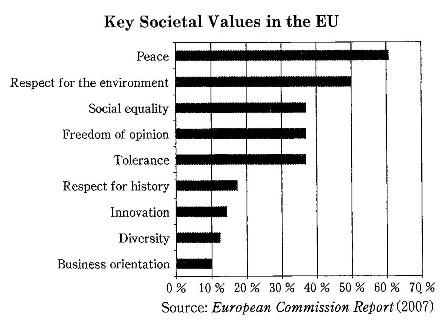問1
問題次の文章の( )に入れるのに最も適当なものを、それぞれ下の1~4のうちから1つずつ選べ。
When people communicate, they usually assume shared values. But in fact, there are often notable differences in the values recognized by particular groups of people. For example, while many people within the European Union (EU) agree on several common values, there are differences among their countries.
A 2007 European Commission report identified clear examples of these similarities and differences. People from various countries were asked to choose which values they consider important in their society. As shown in the graph, majority of the respondents in the EU considered peace important for them (61%). This was followed by respect for the environment, which was selected by exactly half of the respondents.
However, when the results were compared by country, a different picture emerged. Although overall, social equality, freedom of opinion, and ( 問1 ) were equally valued, differences were noted among countries. For example, freedom of opinion was selected by 37 percent of all respondents, but more highly valued on the UK (55%) and Netherlands (52%) than elsewhere. The greatest variation was found in the results for how people regard tolerance, which was selected by 60 percent in the Netherlands but by only 11 percent in Greece.
Such differences in values can cause misunderstandings in communication between people with different backgrounds. To put it another way, to improve communication, it is important to recognize differences in values. Therefore, to become effective communicators, people should reflect objectively on their own values.

問1
Which of the following is the most appropriate for ( 問1 )?
1. diversity
2. innovation
3. peace
4. tolerance
【解説】
図表問題では図表の項目に抜けがあって、そこに当てはまるものを選択肢から選ぶ問題がよく出題されます・・・が、今年はその形式の問題は出題されていません。
まぁ、だからといって解く手順はそれほど変わりませんけれどね。図表読解はまず本文よりも先に図表に注目して、何についての話なのかを掴んでおきましょう。今回の問題の図表のタイトルは Key Societal Values in the EU、つまり「EUにおける主要な社会的価値」についてです。
ついでに簡単に図表の内容を確認しておきましょう。「平和」が1位で60パーセントですね。2位は「環境」で50パーセントなんですね。ふむふむ。まぁ、ありきたりですなぁ。そして3位から5位がほぼ横並びで、そこから緩やかに下がっていく感じ・・・
そして問題が ( 問1 ) に最も適当なものは下のどれですか? というもの。ちなみに appropriate が「適当な」という意味で、アクセントにも注意が必要です・・・っていうか大丈夫ですよね。語尾が
ate なので2つ前にアクセントですね。
で、その選択肢がこれです。
1. diversity
多様性
2. innovation
革新
3. peace
平和
4. tolerance
寛容
え? 意味が分からない? 大丈夫ですよ。( ) のある文をもう一度良く見てみましょう。
社会的平等、意見の自由、および( 問1 )は等しく評価されました
図表の項目と照らし合わせて考えれば大丈夫ですね。
はい、そうです。social equality, freedom of opinion と同じパーセントのものを選びましょう。当然 4 tolerance が正解ですね。ちなみに tolerance は「我慢」という意味です。
【正解】4
問2
問題次の文章の( )に入れるのに最も適当なものを、それぞれ下の1~4のうちから1つずつ選べ。
However, when the results were compared by country, a different picture emerged. Although overall, social equality, freedom of opinion, and tolerance were equally valued, differences were noted among countries. For example, freedom of opinion was selected by 37 percent of all respondents, but more highly valued on the UK (55%) and Netherlands (52%) than elsewhere. The greatest variation was found in the results for how people regard tolerance, which was selected by 60 percent in the Netherlands but by only 11 percent in Greece.

問2
Which of the following statements is true?
1. Greek values regarding tolerance closely follow the EU member trend.
2. People in the EU now believe that business orientation is more important than respect for history.
3. Respect for the environment is less than the three least commonly selected values combined.
4. Netherlands and the UK share a similar view concerning freedom of opinion.
【解説】
選択肢を確認しましょう。
1. Greek values regarding tolerance closely follow the EU member trend.
『tolerance に関するギリシアの値は、EUメンバーの傾向のすぐあとに続きます』
ギリシアがでてくる英文にはこんなことが書いてあります。
人々が寛容をどのように考えているかについて、オランダでは60%が選択したが、ギリシャでは11%しか選択しなかった
オランダは60%だが、ギリシアは11%しかない・・・全然違いますね。closely ではありませんので、この選択肢はダメですね。
2. People in the EU now believe that business orientation is more important than respect for history.
『EUの人々は現在、business orientationがrespect for historyより重要であると信じています』
これはグラフを見れば一目瞭然ですね。どちらの項目が上にあるかといえば respect for history ですので、この選択肢もダメですね。
3. Respect for the environment is less than the three least commonly selected values combined.
『Respect for the environment は下位3つの値を結合したものより少ない』
最下位は Business orientation ですが、これはグラフを見ると10%ですね。その上は Diversity ですが、これは13%といったところでしょうか。さらにその上は Innovation ですが、これは多く見積もっても15%ですかね。
すべてをあわせてみると・・・10%+13%+15%=38% Respect for the environment は50%ですから、遠く及ばないですね。この選択肢もダメです。
4. Netherlands and the UK share a similar view concerning freedom of opinion.
『オランダとイギリスは freedom of opinion に関して、同じような意見を共有しています』
オランダとイギリスを含む英文にはこんなことが書いてあります。
意見の自由は全回答者の37%によって選択されましたが、英国(55%)とオランダ(52%)では他の地域よりも高く評価されています。
freedom of opinionは全体では37%だが、イギリスは55%でオランダは52%となり、他と比べて高い値となっている・・・同じような意見を共有していますね。ということでこの選択肢4が正解です。
【正解】4
このセンター試験第4問A問2は、グラフを見たり本文を見たりしなくてはならなかったので、どこに答えのヒントがあるのかを見つけるのが若干面倒ですね。
問3
問題次の文章の( )に入れるのに最も適当なものを、それぞれ下の1~4のうちから1つずつ選べ。
Such differences in values can cause misunderstandings in communication between people with different backgrounds. To put it another way, to improve communication, it is important to recognize differences in values. Therefore, to become effective communicators, people should reflect objectively on their own values.

問3
According to the writer, what is needed to become a good communicator?
1. To agree on a shared set of values.
2. To consider the number of respondents.
3. To have a high regard for EU member countries.
4. To think about one’s own values and those of others.
【解説】
問題文はこうなっています。
『筆者によると、よいコミュニケーターになるためには何が必要ですか?』
「筆者によると」とある時点で、これは「筆者の主張」を読み取ればよいわけです。では「筆者の主張」は本文のどこに書いてあるのでしょう? そうです。たいてい最後の段落に書いてありますね。
そこで最終段落を見てみると、もう1つ注目すべき語が見つかります。それは should です。意味はご存知のとおり「~すべき」、まさに「筆者の主張」です。ではその should を含む一文を確認してみましょう。
『それゆえ、効果的なコミュニケーターになるためには、人々は自分自身の価値観を客観的に反映させなくてはならない』
・・・価値観を客観的に反映させる??? 何か言っていることが分かりづらいですね・・・
そこでこの英文の最初にある Therefore に注目します。これは「それゆえ」という意味で、その前の英文にこの英文の理由が書いてあることを表しています。つまり「価値観を客観的に反映させなくてはならない」理由が、その前の英文にあるわけです。
『言い換えれば、コミュニケーションを改良するために、価値観の違いを認識するのは重要です』
「言い換えれば」ということは、さらにその前の英文には同じ意味の内容が書かれてあるということです。
『そのような価値観の違いのために、異なるバックグラウンドを持つ人々はコミュニケーションで誤解をしてしまう』
結局、最終段落を全部読んでしまいましたが、おかげでなんとなく分かってきましたね。つまり、価値観が違う人が話し合うときには、相手がどういう価値観を持った人なのかを良く知って、自分勝手にならないようにしないといけないよ、ということですね。
それを踏まえて選択肢を確認していきましょう。
1. To agree on a shared set of values.
『共有された価値の傾向に同意すること』
なんか正しそう・・・だけど・・・うーん・・・
2. To consider the number of respondents.
『回答者の数を考えること』
え? どういうこと? 多数決に従えってこと?
3. To have a high regard for EU member countries.
『EUの加盟国に対して高い敬意を持つこと』
いやいや、EUに対してだけですか?
4. To think about one’s own values and those of others.
『自分自身の価値観や他人の価値観について考えること』
あ、これですね。
1.と4.で迷うところだと思いますが、「相手と自分の価値観の違いを認識することが重要」なのであって、「共有された価値の傾向に同意しなくちゃいけない」とまでは言っていないですね。ということで、選択肢4が正解です。
【正解】4



コメントをどうぞ